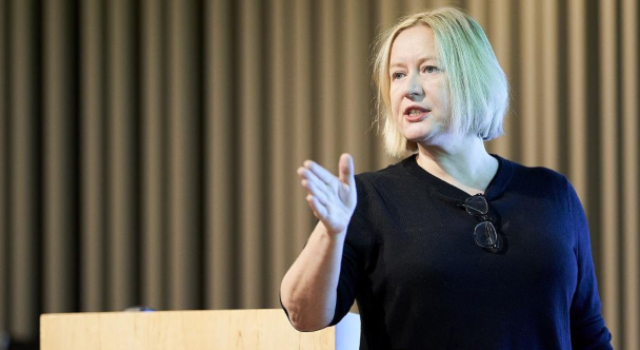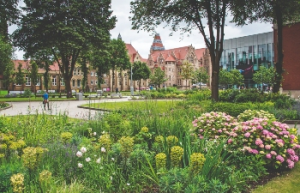
Academic Spotlight: Julia Buxton on drugs, illicit economies and violence
Julia Buxton is a British Academy Global Professor. In this blog, she shares with us some insights on her research into drugs, the strengths of the Criminology department and her teaching.
Background
I came to Manchester as a British Academy Global Professor after 7 years at Central European University (CEU), a US accredited university in Budapest, Hungary. I worked in the School of Public Policy, which was established to develop practice focused teaching for ‘real world’ application. Our students were from all over the globe and their diverse backgrounds and experience brought an immense richness to the classroom.
Prior to CEU I was at the University of Bradford, where my research, teaching and consultancy focused on conflict and post-conflict contexts and related issue areas such as security sector reform; demobilisation, disarmament, and reintegration of ex-combatants; informal economies; and conflict and gender-sensitive policy processes. Latin America has been my main area of geographic specialisation, but my teaching and policy work has enabled me to work in countries such as the US, Canada, Nepal and Pakistan.
On Manchester
The research for the Global Professorship focuses on the dynamic changes in supply-side activities in illicit drug markets, and the impact of Brexit on British security and foreign policy as this relates to drug supply. Criminology at The University of Manchester was the optimal place to locate for the research. Criminology is a hub of expertise on drugs and drug policy and home to high profile colleagues conducting cutting edge research in this area such as Judith Aldridge, Lisa Williams and Will Floodgate. More broadly, Criminology has leading experts in thematic areas that link to my research, including illicit markets and white-collar crime, digitally-enabled crime, violence (including gender violence), and prisons and policing. The size of the University was also attractive for the opportunities of inter-disciplinary work extending beyond the social sciences. For example, Joanna Neill, Professor of Psychopharmacology is a leading expert on psychedelic-assisted therapies and it has been fantastic to do events and podcasts with Jo. Links between social science and clinical research are important if drug policy analysis is to break out of stifling disciplinary silos.
(including gender violence), and prisons and policing. The size of the University was also attractive for the opportunities of inter-disciplinary work extending beyond the social sciences. For example, Joanna Neill, Professor of Psychopharmacology is a leading expert on psychedelic-assisted therapies and it has been fantastic to do events and podcasts with Jo. Links between social science and clinical research are important if drug policy analysis is to break out of stifling disciplinary silos.
The environment for research and teaching on drugs and drug policy in Criminology and at Manchester is attractive due to shared epistemological concerns relating to reducing the harms of bad policy and enforcement practices; enabling the voices of those with lived experience to be heard; and developing evidence-based knowledge of best policy approaches. This in turn links to the social responsibility values of The University of Manchester and the emphasis on inter-disciplinary research.
I am also from Manchester, so in some respects I feel like I have come home and as my own daughter starts her university journey.
My research
I came to drug policy research through disparate personal, academic and research experiences. Observable negative outcomes ranging from lack of access to medical morphine in palliative care, displacement of Colombian refugees in Venezuela, and violence in the areas of Manchester and London where I had lived or was living all configured around the criminalisation and policing of drugs and drug ‘wars’. This led me to try and better understand the historical, economic, and political context of the international system and of national laws that determine drug policy approaches.
International ‘narcotics’ control has historically been framed as supply reduction efforts led by ‘consumer’ countries of the Global North to prevent access to plant-based drugs (cocaine, heroin, cannabis) cultivated and manufactured in the Global South. Illicit markets are undergoing dramatic change. This includes due to the rise of synthetic ‘chemical’ drugs (methamphetamine, amphetamine, MDMA, ‘legal highs’) that are not reliant on inputs from plants grown in remote geographic zones; new technologies that enable non-environmentally dependent cannabis cultivation, and technological platforms such as the darknet and encrypted digital messaging and payment systems that are revolutionising how illicit drugs are sold and bought.
undergoing dramatic change. This includes due to the rise of synthetic ‘chemical’ drugs (methamphetamine, amphetamine, MDMA, ‘legal highs’) that are not reliant on inputs from plants grown in remote geographic zones; new technologies that enable non-environmentally dependent cannabis cultivation, and technological platforms such as the darknet and encrypted digital messaging and payment systems that are revolutionising how illicit drugs are sold and bought.
The research project explores how these shifts are impacting supply and distribution networks; changing patterns of illicit drug use (including the number of women who use drugs) and how traditional counter-narcotics enforcement and cooperation is responding to these global shifts.
Several countries have introduced some form of drug decriminalisation/legalisation, and the research examines if and how this is changing the ‘quality’ of local drug policies, for example, do these reform initiatives reduce stigma and improve access to and uptake of treatment services? Do regulated drug markets reduce the violence associated with illicit markets? And can decriminalisation/legalisation reduce the injustices and harms associated with drug policing?
These questions are particularly pertinent for the UK, which has drug legislation that is now 50 years old; where drug-related deaths are among the highest in Europe; and where criminalisation has failed to reduce illicit drug supply and demand. The UK also hosts a significant volume of darknet market transactions. While performing so poorly in illicit market containment, the UK is one of the world’s leading exporters of ‘legal’ cannabis, pharmaceutical opiates and re-exporter of cocaine.
There is significant and high-level interest in these interwoven research questions and I am fortunate to have been able to have had the opportunity of presenting various strands of the research (focusing on gendered impacts of criminalisation, and on the drugs and development nexus in the Global South) over the last year, including panels of politicians, academics, policymakers and people with lived experience of illicit drug markets that have been convened in Morocco, Switzerland, Ireland, China, at the UN library, at the Royal College of Defence Studies and TedX Students Manchester, as well as on podcasts with Professor David Nutt, on the BBC World Service and the SKRAPS science and technology podcast. These build on my 2020 co-edited publications (open access) ‘The Impact of Global drug Policy on Women: Shifting the Needle‘ and ‘Drug Policies and Development: Conflict and Co-Existence‘.
Postgraduate teaching
My involvement in postgraduate teaching is focused on the delivery of the PGT course ‘Evaluating Policy’. This encourages students to engage with the challenges of translating evidence-based criminological research into policy and programming, and to apply tools and concepts such as stakeholder mapping and theories of change. I also co-supervise a doctoral thesis that explores the engagement of Venezuelan women migrants in Colombia with sex work.






0 Comments